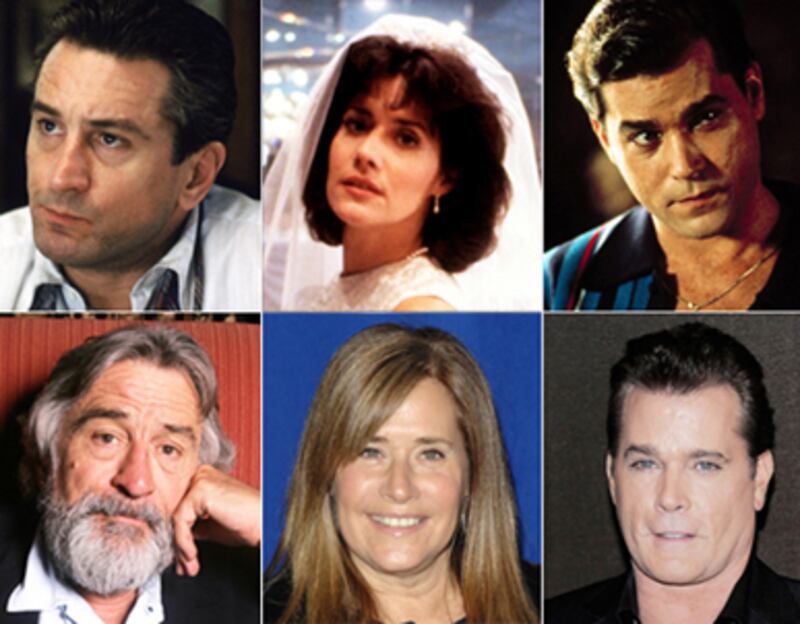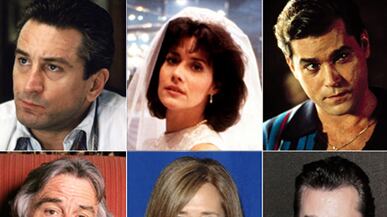When I first saw Goodfellas at the Curzon Cinema in London when I was 25, I was so overwhelmed that I had to go back to see it again the same week. It was an immediate guilty pleasure. No "classic" film could be this much fun, I thought, or this dense. Even the celebrated shot of Uncle Paulie cutting garlic with a razor blade has a sprig of parsley in the foreground. But I was also compelled to return to the theater because I found the movie so unsettling—it was simultaneously seductive and queasy. It is a 25-year life of crime presented with the verve of a movie trailer—and without one hint of sanctimony.
"The whole key to making the picture was the idea that we were not going to do a picture about mobsters and gangsters," Martin Scorsese told the BBC around the film's release in 1990. "It's a picture about people—oh, and by the way, they just happen to make their living out of being gangsters."
Gallery: Goodfellas Stars: Then and Now
ADVERTISEMENT

Scorsese wrote the script with Nicholas Pileggi, adapting his first-person account of real-life mob informant Henry Hill, entitled Wiseguy. "Henry Hill was a just a gofer," remembers veteran crime reporter Pileggi. "I wanted a sergeant in Napoleon's army who could tell me what really happened at Waterloo. He was half-Irish, too [and] inside the mob, but not of it, which enabled him to look at the world like an anthropologist."
The film follows the classic rise and fall of the gangster tradition that began in 1930s, which was essentially fully formed with Scarface, Little Caesar, and Public Enemy. The opening song of Goodfellas is even a version of "Rags to Riches" by Tony Bennett. But in the movie's first hour, there is no hint of the hero's fall to come. Henry (Ray Liotta) recalls his days from schoolboy to mob hood with unrepentant nostalgia. "I was the luckiest kid in the world," he says. "I was living in a fantasy." According to Pileggi, Henry is "Tom Sawyer in the mob."
The story is craftily arranged, seducing viewers just as thoroughly as the central character himself. Law enforcers are shown to be equally corrupt as those breaking the law. Though the hero's father beats him viciously, this gangster family is a model of altruistic stability. They are, in fact, the self-appointed "police department for wiseguys."
So why wouldn't young Henry join this criminal family?
The clues to his inevitable fall are there, but they are all comic throwaways and asides. "I wonder about you, Henry," his friend and fellow gangster Tommy DeVito (Joe Pesci) says, for example. "You may fold under questioning."
The only sleight of hand I can detect is the fact that our hero never actually kills anyone himself. When the murders start piling up after the Lufthansa airport heist, the film discreetly pulls back to show scenes without Henry for the first time. Yet, it never soft-pedals his self-interest or greed. Henry turns out to be a complete rat and an unrepentant one at that.
The New Yorker critic Pauline Kael dismissed the film as "journalism presented with the brio of drama." But I think it's a peak of fully realized storytelling. (Kael also called the film "inert" and said the three lead actors—Ray Liotta, Robert De Niro, Joe Pesci—didn't have a "strong enough presence.")
Despite some criticism, Goodfellas was a solid hit, taking in $46 million at the U.S. box office. Its creative influence, however, has proven immense. For his 1997 porn epic Boogie Nights, for example, director Paul Thomas Anderson plundered Scorsese's era-jumping structure wholesale, not to mention the nightclub Steadicam shot, the "showing off the new house" sequence, the cocaine-fueled descent and so on. Goodfellas' opening line—"As far back as I can remember, I've always wanted to be a gangster"—was also voted No. 20 by Premiere magazine on its list of " 100 Greatest Movie Lines."
Ultimately, like most gangster films, Goodfellas is comforting. Mob movies give us a taste of the criminal life, and then reassure us that the consequences for such a life are horrifyingly high. Scarface, for example, is reduced to a coke-snorting wreck as he realizes his mistakes once it's too late. And the door closes on Michael Corleone at the end of in The Godfather, leaving him unmistakably a man without a soul.
But these are classical tragedies. Goodfellas is, audaciously, a black comedy. The hero's lack of repentance is carried through right to the end. After Henry betrays all of his Mafia cohorts in court, he looks directly into the camera and explains that the only things he regrets are the perks—the money, the thrill, the action. "The hardest thing for me," he says, "was leaving the life." Pileggi explains that, "the characters showed no remorse at the end because they had nothing to start with—no empathy, nothing." He adds, "The real-life wiseguys were a riot to hang out with, the most fun in the world over dinner, but they didn't have an ounce of spirituality."
Black comedies like Dr. Strangelove or: How I Learned to Stop Worrying and Love the Bomb and Network show characters in a system that initially gives them power, but ultimately destroys them. Occasionally, the protagonist will realize the futility of the structure and flee, as in Brazil or Catch 22. But usually, they have no such epiphany. The final moral reckoning is instead thrown onto the audience. Upon first viewing, the ending of Goodfellas felt abrupt to me. It was not exactly a cop out, but dislocating nonetheless. Since then, I've come to realize that's the whole point.
Sean Macaulay is a screenwriter, humorist and journalist, specializing in symptoms of the post-macho midlife crisis. He was the L.A. movie critic for The London Times from 1999 to 2007, and has written for The Daily Telegraph, Radio Times, Punch, and British GQ. He was most recently creative consultant on Anvil! The Story of Anvil, which was voted Best Documentary at the Independent Spirit Awards. You can follow him on Twitter here.






